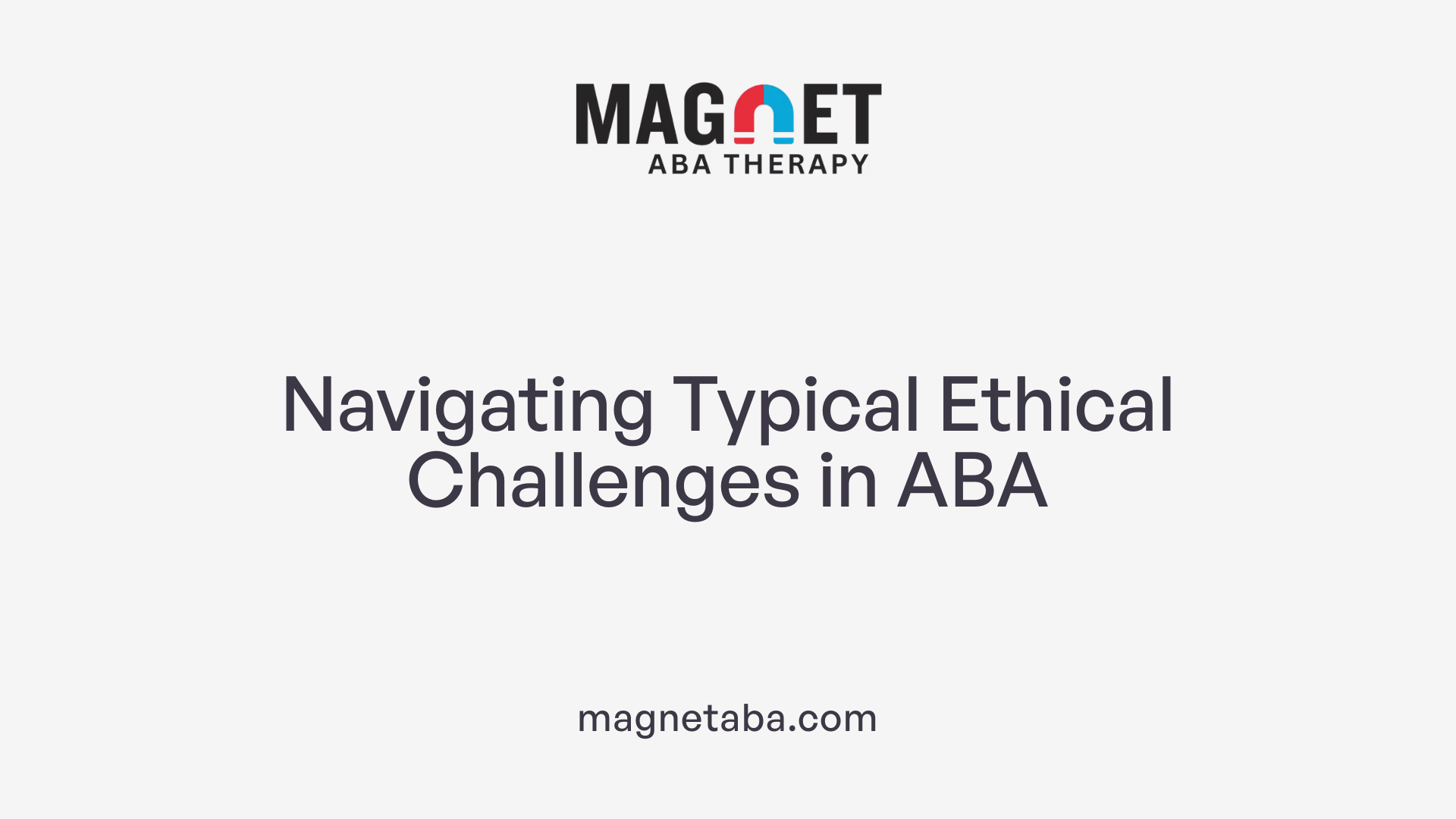Understanding the Foundations of Ethical ABA Practice
Applied Behavior Analysis (ABA) is a widely used intervention for individuals with autism and other behavioral concerns. As practitioners dedicated to improving lives, behavior analysts are guided by comprehensive ethical standards designed to ensure responsible and effective treatment. This article explores the core principles, policies, and ongoing ethical challenges integral to ABA therapy, emphasizing the importance of a principled approach informed by current codes, evidence, and societal considerations.
Core Ethical Principles and Standards in ABA Therapy

What are the key ethical principles and standards in ABA therapy?
Behavior analysts practicing in ABA are guided by the Behavior Analyst Certification Board (BACB) Code of Ethics, which sets comprehensive standards for professional conduct. These principles are designed to promote the well-being of clients while maintaining high standards of integrity and professionalism.
A fundamental aspect of ethical practice is beneficence, which means acting to benefit clients, and nonmaleficence, ensuring that no harm comes to them. Behavior analysts are responsible for creating safe, effective, and respectful treatment environments. They are also tasked with protecting clients' dignity and autonomy, respecting their rights to make informed decisions about their care.
Justice and fairness are crucial, emphasizing equitable access to quality treatment regardless of a client’s background or circumstances. Behavior analysts must deliver services within their scope of competence, continually updating their skills through ongoing education. They also maintain honesty and transparency, especially in handling data, reporting outcomes accurately, and public communication.
Upholding professional integrity involves being truthful in all interactions, avoiding conflicts of interest, and safeguarding client confidentiality. In research or public activities, practitioners must adhere to strict privacy standards and obtain informed consent, particularly when digital content or media is involved.
Ultimately, ethical decision-making is an ongoing process that integrates empirical evidence, ethical guidelines, and the clients’ preferences. By adhering to these standards, behavior analysts ensure that their interventions are not only effective but also respectful and just, aligning with the core values of the discipline.
| Ethical Principle | Description | Additional Considerations |
|---|---|---|
| Beneficence & Nonmaleficence | Promote client well-being and avoid harm | Prioritize safety and effectiveness |
| Respect & Autonomy | Uphold clients' dignity and right to make informed choices | Informed consent, digital content management |
| Justice & Fairness | Ensure equitable access and treatment for all clients | Cultural responsiveness, nondiscrimination |
| Professional Integrity & Competence | Maintain honesty, transparency, and skill proficiency | Continuing education, ethical adherence |
This ethical framework is essential for achieving quality outcomes and fostering trust between behavior analysts and the communities they serve.
Guidelines and Policies for Ethical Practice

What guidelines and policies do behavior analysts follow to ensure ethical practice?
Behavior analysts adhere to the Ethics Code for Behavior Analysts, formed by the Behavior Analyst Certification Board (BACB). Implemented in January 2022, this code provides detailed standards covering all facets of behavior analysis, including direct service, consultation, supervision, research, and professional conduct.
The core principles of the BACB Ethics Code include beneficence (aiming to benefit clients), nonmaleficence (avoiding harm), respect, integrity, and competence. These principles serve as the foundation for ethical decision-making and guide practitioners to prioritize clients’ rights and well-being.
Practitioners are required to operate within their professional scope, demonstrate cultural sensitivity, and communicate truthfully. They must ensure clients understand their treatment options through informed consent, which covers how digital content may be used. Maintaining confidentiality and proper documentation are critical, with all records handled securely and in compliance with laws such as HIPAA.
The BACB’s policies include strict standards to prevent conflicts of interest and dual relationships, which could impair objectivity. Homing in on honesty, behavior analysts must provide accurate information in reports, public statements, and billing to foster trust and transparency.
Enforcement of these standards occurs through the BACB’s disciplinary procedures. It investigates complaints and can revoke certification if misconduct is confirmed. Continuous professional development is emphasized to keep practitioners updated on evolving ethical standards and scientific practices.
Finally, the BACB endorses ongoing cultural responsiveness, encouraging behavior analysts to be aware of their biases and how these can influence treatment. The comprehensive guidelines aim to uphold the integrity of the profession, protect clients’ rights, and foster responsible, evidence-based practice.
Below is a summary table highlighting the main components of ethical practice in behavior analysis:
| Aspect | Policy Details | Purpose/Goal |
|---|---|---|
| Ethical Guidelines | Follow BACB’s Ethics Code for Behavior Analysts | Ensure responsible, standard-compliant practice |
| Confidentiality | Protect client data; secure consent before disclosures | Maintain privacy; legal compliance |
| Informed Consent | Clearly explain treatment, risks, benefits; ensure ongoing consent | Promote autonomy; informed decision-making |
| Scope of Practice | Work within competence; pursue ongoing education | Ensure quality and safety of interventions |
| Public Communication | Provide truthful info; avoid misrepresentation | Build trust and professionalism |
| Enforcement | BACB investigates misconduct; enforces sanctions | Uphold accountability and standards |
| Professional Development | Engage in continuous learning; stay updated on ethics | Maintain competence; improve practice |
Adhering to these policies ensures that behavior analysts act ethically, safeguarding client welfare and promoting the credibility of the field.
Ethical Considerations in ABA Treatment for Autism
Respecting client dignity and promoting autonomy
In ABA therapy for autism, respecting the inherent dignity of clients and promoting their autonomy are fundamental ethical principles. Behavior analysts are required to treat each individual with compassion, dignity, and respect, ensuring that interventions uphold their rights and personal values. Informed consent is a critical component, where clients and their guardians are fully educated about the nature, risks, and benefits of treatment options. This transparency fosters trust and empowers families to participate actively in decision-making.
Ensuring evidence-based and culturally competent interventions
Effective ABA practice depends on scientifically supported methods tailored to each person's unique cultural context. Practitioners are obliged to utilize interventions grounded in empirical research, aligning treatment goals with the client's needs and values. Continuous professional development helps providers stay current with advances, ensuring competence and cultural responsiveness. Respecting diversity involves understanding cultural backgrounds and addressing potential biases, which is vital for ethical service delivery.
Safeguarding autonomy of children and parents
Maintaining the autonomy of both children and their families involves ensuring they are thoroughly informed and their preferences are respected whenever possible. While children are often unable to make full decisions, involving parents and guardians in treatment planning and respecting their insights enhances ethical standards. Avoiding coercive or aggressive practices is crucial, especially when resource or societal pressures threaten to override individual choice.
Managing societal and resource-related pressures
External pressures such as societal expectations, limited resources, or institutional demands can challenge ethical practice. Behavior analysts must resist overextending services that are unwarranted or invasive just to meet external goals. Prioritizing ethical standards over convenience or resource constraints helps protect the rights and well-being of clients. This includes refusing to engage in practices that may harm or disempower clients and advocating for equitable access to quality services.
Handling complex ethical issues responsibly
ABA practitioners frequently encounter complex ethical dilemmas, like dual relationships or conflicts of interest. Addressing these issues requires a transparent, reflective approach grounded in the BACB Code of Ethics and other professional standards. Open communication, ongoing supervision, and consultation with colleagues support responsible decision-making. Regular ethical review, staying informed about legal and societal changes, and promoting ongoing ethical education are essential for practitioners who aim to provide ethical, client-centered care.
| Aspect | Ethical Requirement | Additional Notes |
|---|---|---|
| Respect & Dignity | Treat clients with compassion and respect | Avoid dehumanizing practices |
| Informed Consent | Fully inform clients/guardians | Ongoing process, especially for digital media |
| Evidence-Based Treatment | Use scientifically supported methods | Continuous training required |
| Cultural Competence | Understand and respect cultural backgrounds | Adapt interventions accordingly |
| Client Autonomy | Respect client and family choices | Engage in collaborative decision-making |
| Avoid Harm | Do no harm and prevent overreach | Vigilant against invasive practices |
| Integrity & Transparency | Be honest and clear | Manage conflicts of interest openly |
| Resource Management | Use resources ethically | Prioritize client's best interest |
In essence, ethical ABA treatment for autism hinges on respecting the individual, applying scientifically validated interventions, and navigating societal influences with integrity. Continuous education and self-awareness are vital tools for practitioners committed to safeguarding client rights and promoting optimal outcomes.
Common Ethical Dilemmas Faced by Behavior Analysts

What are some common ethical dilemmas faced by behavior analysts?
Behavior analysts regularly encounter challenges that test their adherence to ethical standards. These dilemmas often involve balancing the need to respect client autonomy with the obligation to ensure safety. For example, making decisions that could limit a client’s freedom to protect their well-being requires careful ethical judgment.
Another frequent issue is managing dual relationships. These can occur when a behavior analyst has multiple roles with a client or their family, such as being both a service provider and a personal acquaintance. Such relationships can impair objectivity and should be avoided to prevent conflicts of interest.
Informed consent and confidentiality present ongoing challenges, especially in digital contexts where information sharing must be carefully managed to comply with laws like HIPAA. Ensuring that clients or guardians fully understand therapy processes and media usage is crucial.
Cultural sensitivity is also necessary. Discrimination or a lack of awareness of cultural differences can lead to unethical practices, limiting access to equitable treatment. Behavior analysts must remain culturally responsive and avoid biases that could harm clients.
Compliance with legal and professional standards adds another layer of complexity. Practitioners must stay updated with the BACB code, legal regulations, and emerging ethical guidelines. This includes avoiding pseudoscientific treatments, unvalidated interventions, or practices that could cause harm.
Overall, ethical decision-making involves balancing beneficence—the goal to benefit clients—and nonmaleficence—the obligation to do no harm. It also requires advocating for clients' interests while respecting their families, cultural values, and autonomy.
Understanding these dilemmas is essential for behavior analysts committed to maintaining the highest standard of ethical practice, fostering trust and integrity in their professional work.
| Ethical Dilemma | Key Concerns | Recommended Practice |
|---|---|---|
| Client autonomy vs. safety | Respecting choices while preventing harm | Use informed consent, risk assessment, and professional judgment |
| Dual relationships | Maintaining objectivity and professionalism | Avoid multiple roles and manage boundaries effectively |
| Informed consent & confidentiality | Respecting privacy and ensuring understanding | Provide clear info, secure agreements, comply with HIPAA |
| Cultural sensitivity | Preventing discrimination and bias | Engage in cultural competence training and awareness |
| Legal & professional standards | Ensuring compliance and avoiding pseudoscience | Regular training, supervision, and review of ethical guidelines |
Engaging with these ethical concerns helps behavior analysts uphold their commitment to integrity, client welfare, and the responsible practice of ABA.
Decision-Making Frameworks for Ethical Challenges

How do behavior analysts approach decision-making with complex ethical issues?
Behavior analysts utilize structured, systematic approaches to navigate complex ethical dilemmas. These frameworks help ensure their actions align with professional standards, legal requirements, and ethical principles such as beneficence, nonmaleficence, autonomy, and justice.
One common tool is the ten-step ethical decision-making model, which guides practitioners through identifying the dilemma, gathering pertinent information, evaluating available options, and documenting their decisions. This process encourages careful consideration of all factors involved, including the client’s safety, rights, and preferences.
Consultation and supervision play vital roles in ethical decision-making. Behavior analysts regularly seek input from colleagues, supervisors, or ethics committees to gain diverse perspectives and ensure their decisions are well-informed and balanced.
When approaching complex issues, practitioners incorporate multiple considerations: legal and professional standards, client values and cultural context, and the potential impact of their actions. Ensuring informed consent, maintaining confidentiality, and avoiding conflicts of interest are prioritized throughout.
Evidence-Based Practice (EBP) supports ethical choices by integrating the best available research, clinical expertise, and client preferences. This approach promotes effective, individualized interventions that respect client autonomy and promote positive outcomes.
Thorough documentation and transparency are essential. Clear records of decision-making processes, consent forms, and communication help uphold accountability and facilitate ongoing ethical review.
In summary, behavior analysts rely on a combination of systematic models, expert consultation, legal and ethical considerations, and evidence-based practices to navigate complex ethical situations. This comprehensive approach ensures their interventions are ethically sound, respectful, and aligned with professional standards.
Emerging Trends and Ongoing Ethical Challenges

What are emerging trends and ongoing ethical challenges in behavior analysis?
The field of behavior analysis is experiencing significant advances driven by new technologies and societal changes. One notable trend is the increased use of telehealth and digital interventions. These methods provide greater access to services, especially in remote or underserved communities. Virtual reality and other advanced tools are also emerging, offering innovative ways to deliver therapy.
However, these developments bring new ethical considerations. Privacy and data security are more critical than ever. Protecting confidential client information collected through digital means must comply with laws like HIPAA and adhere to ethical standards set by the BACB.
Along with technological advances, the profession faces ongoing challenges related to maintaining core ethical principles such as beneficence, autonomy, and justice. As practice settings become more diverse, behavior analysts must adapt to culturally sensitive approaches while safeguarding clients’ rights.
The Evidence-Based Practice (EBP) framework is vital in this evolving landscape. It supports ethical decision making by blending the best scientific evidence, practitioner expertise, and client preferences. This approach helps practitioners navigate complex situations involving innovations and interdisciplinary collaboration.
Ethical dilemmas such as dual relationships, conflicts of interest, transparency, and accountability are persistent concerns. Practitioners must engage in continuous ethics training and organizational oversight to uphold standards.
Looking ahead, future challenges include implementing value-based care models that prioritize client outcomes, ensuring equitable service access across different populations, and fostering a culture of transparency. Emphasizing ethical responsibility in these areas will be essential for the integrity and professionalism of behavior analysis.
Building Ethical Competency and Continuous Professional Development

How do behavior analysts develop and maintain ethical competency?
Behavior analysts strengthen their understanding of ethics through continuous education. Regular ethics training sessions, workshops, and seminars focus on core principles like beneficence, nonmaleficence, respect, and integrity. These opportunities keep practitioners updated on evolving standards, relevant laws, and societal issues affecting practice.
Engaging with current research and reviewing updates to the BACB Ethics Code are crucial. Such involvement ensures behavior analysts stay informed about advances and emerging ethical considerations in the field. Participating in case discussions and supervision helps develop complex ethical decision-making skills.
Cultivating a responsible organizational culture of ethics supports accountability. That includes encouraging open dialogue about ethical dilemmas, self-reflection, and peer evaluations. Such a climate fosters responsible behavior and helps practitioners recognize and correct potential biases.
Staying informed about societal issues like systemic racism, cultural responsiveness, and legal changes further safeguards client rights and welfare. Continuous professional development, with an emphasis on ethics, enables behavior analysts to uphold the highest standards, ensuring effective, respectful, and ethically sound practice.
Striving for Ethical Excellence in Behavior Analysis
Upholding ethical standards in ABA is essential to ensuring safe, equitable, and effective treatment for all clients. By continuously engaging with established guidelines, embracing evidence-based practice, and fostering a culture of ethical responsibility, behavior analysts can navigate complex situations and uphold the integrity of their profession. As the field evolves with technological advancements and societal changes, ongoing education and reflective judgment remain pivotal. Ethical practice is not a static goal but a dynamic commitment to the well-being and rights of those served, ultimately ensuring that ABA continues to be a responsible and respected discipline.
References
- Ethics Code for Behavior Analysts
- Ethical Considerations - Association for Behavior Analysis ...
- Ethical Concerns with Applied Behavior Analysis for Autism ...
- Ethics for Behavior Analysts
- Ethical Behavior Analysis: Evidence-Based Practice as a ...
- Ethics in ABA
- Ethics Code for Behavior Analysts
- Ethical Behavior Analysis: Evidence-Based Practice as a ...
- Ethics for Behavior Analysts












